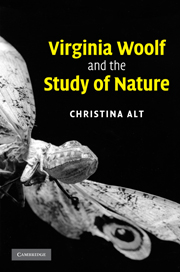Book contents
- Frontmatter
- Contents
- Acknowledgements
- List of abbreviations
- Introduction
- 1 The natural history tradition
- 2 The modern life sciences
- 3 ‘To pin through the body with a name’: Virginia Woolf and the taxonomic tradition
- 4 Laboratory coats and field-glasses: Virginia Woolf and the modern study of nature
- 5 Representing ‘the manner of our seeing’: Literary experimentation and scientific analogy
- Notes
- Bibliography
- Index
Introduction
Published online by Cambridge University Press: 04 August 2010
- Frontmatter
- Contents
- Acknowledgements
- List of abbreviations
- Introduction
- 1 The natural history tradition
- 2 The modern life sciences
- 3 ‘To pin through the body with a name’: Virginia Woolf and the taxonomic tradition
- 4 Laboratory coats and field-glasses: Virginia Woolf and the modern study of nature
- 5 Representing ‘the manner of our seeing’: Literary experimentation and scientific analogy
- Notes
- Bibliography
- Index
Summary
In Birds and Man (1901), the nature writer W. H. Hudson attacks the preoccupation with specimen collection that had long characterised the natural history tradition, describing preserved bird specimens as ‘a falsification and degradation of nature’ and presenting the specimen collector as stricken by ‘the curious delusion that the lustre which we see and admire [in a living bird] is in the case, the coat, the substance which may be grasped, and not in the spirit of life which is within and the atmosphere and miracle-working sunlight which are without’. In place of this artificial preservation, he recommends the observation of living birds in the wild and speaks of the enduring power of his memories of such sightings, ‘this incalculable wealth of images of vanished scenes’.
The opposition that Hudson sets up between the capture of specimens and the observation of living creatures reflects a broad shift in the study of nature that began around the turn of the century, and this shift resonates beyond the study of nature to a change in outlook that characterised Virginia Woolf's literary modernism. Woolf alludes to the study of nature as a means of articulating wider ideas about the perception and description of life. In ‘The Lady in the Looking-Glass: A Reflection’, two views of a room and its occupant are juxtaposed.
- Type
- Chapter
- Information
- Virginia Woolf and the Study of Nature , pp. 1 - 13Publisher: Cambridge University PressPrint publication year: 2010



